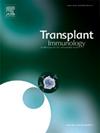同种异体干细胞移植对复发或难治性霍奇金淋巴瘤患者的疗效:伊朗的经验
IF 1.4
4区 医学
Q4 IMMUNOLOGY
引用次数: 0
摘要
干细胞移植(SCT)是诊断为高风险经典霍奇金淋巴瘤(cHL)(一种罕见的淋巴细胞增生性疾病)的患者的潜在治愈治疗方法。本研究对伊朗德黑兰Taleghani医院14年间(2007-2021年)273例复发或难治性cHL患者进行了全面回顾性分析。结果表明,63%接受自体sct治疗的患者获得了完全缓解。然而,大约4%的研究人群(10例患者)在自体sct治疗失败后继续进行同种异体sct (I组)。此外,在其他10例患者中,自体sct不可行,只能通过同种异体sct进行治疗(II组)。人口统计学和临床特征,包括性别、cHL亚型、放疗史、大体积疾病的存在和移植物抗宿主病(GVHD)的发病率,收集并分析以评估治疗结果。总生存期(OS) I组42.1个月,II组17.3个月。虽然整个队列的总体完全缓解(CR)为45%,但I组和II组的相应CR分别为60%和30%。总之,同种异体sct似乎是一种可行的治疗策略,至少50%的患者经历自体sct失败。同种异体sct的疗效可能受到一些因素的影响,如cHL亚型和先前的自体sct治疗。值得注意的是,第一组中经历移植物抗宿主病(GVHD)的个体表现出较长的生存期。本文章由计算机程序翻译,如有差异,请以英文原文为准。

Allogenic stem cell transplantation response for relapsed or refractory Hodgkin lymphoma patients: An experience in Iran
Stem cell transplantation (SCT) is a potentially curative therapeutic approach for patients diagnosed with high-risk classic Hodgkin Lymphoma (cHL), a rare lymphoproliferative disorder. This study presents a comprehensive retrospective analysis of 273 patients with relapsed or refractory cHL referred to Taleghani Hospital in Tehran, Iran, over a 14-year period (2007–2021). The results indicated that 63 % of individuals receiving autologous-SCT achieved a complete response. However, approximately 4 % of the study population (10 patients) experienced treatment failure after autologous-SCT and proceeded to allogeneic-SCT (Group I). Additionally, in ten other cases, autologous-SCT was not feasible, and treatment was exclusively managed through allogeneic-SCT (Group II). Demographic and clinical characteristics, including gender, cHL subtype, history of radiotherapy, presence of bulky disease, and incidence of graft-versus-host disease (GVHD), were collected and analyzed to assess treatment outcomes. The overall survival (OS) was 42.1 months for Group I and 17.3 months for Group II. Although the overall complete response (CR) for the entire cohort was 45 %, the corresponding CR for Groups I and II were 60 and 30 %, respectively. In conclusion, allogenic-SCT appears to be a viable therapeutic strategy for at least 50 % of patients experiencing autologous-SCT failure. The efficacy of allogenic-SCT may be influenced by factors such as cHL subtype, and prior auto-SCT therapy. Notably, individuals in Group I who experienced graft-versus-host disease (GVHD) exhibited prolonged survival.
求助全文
通过发布文献求助,成功后即可免费获取论文全文。
去求助
来源期刊

Transplant immunology
医学-免疫学
CiteScore
2.10
自引率
13.30%
发文量
198
审稿时长
48 days
期刊介绍:
Transplant Immunology will publish up-to-date information on all aspects of the broad field it encompasses. The journal will be directed at (basic) scientists, tissue typers, transplant physicians and surgeons, and research and data on all immunological aspects of organ-, tissue- and (haematopoietic) stem cell transplantation are of potential interest to the readers of Transplant Immunology. Original papers, Review articles and Hypotheses will be considered for publication and submitted manuscripts will be rapidly peer-reviewed and published. They will be judged on the basis of scientific merit, originality, timeliness and quality.
 求助内容:
求助内容: 应助结果提醒方式:
应助结果提醒方式:


